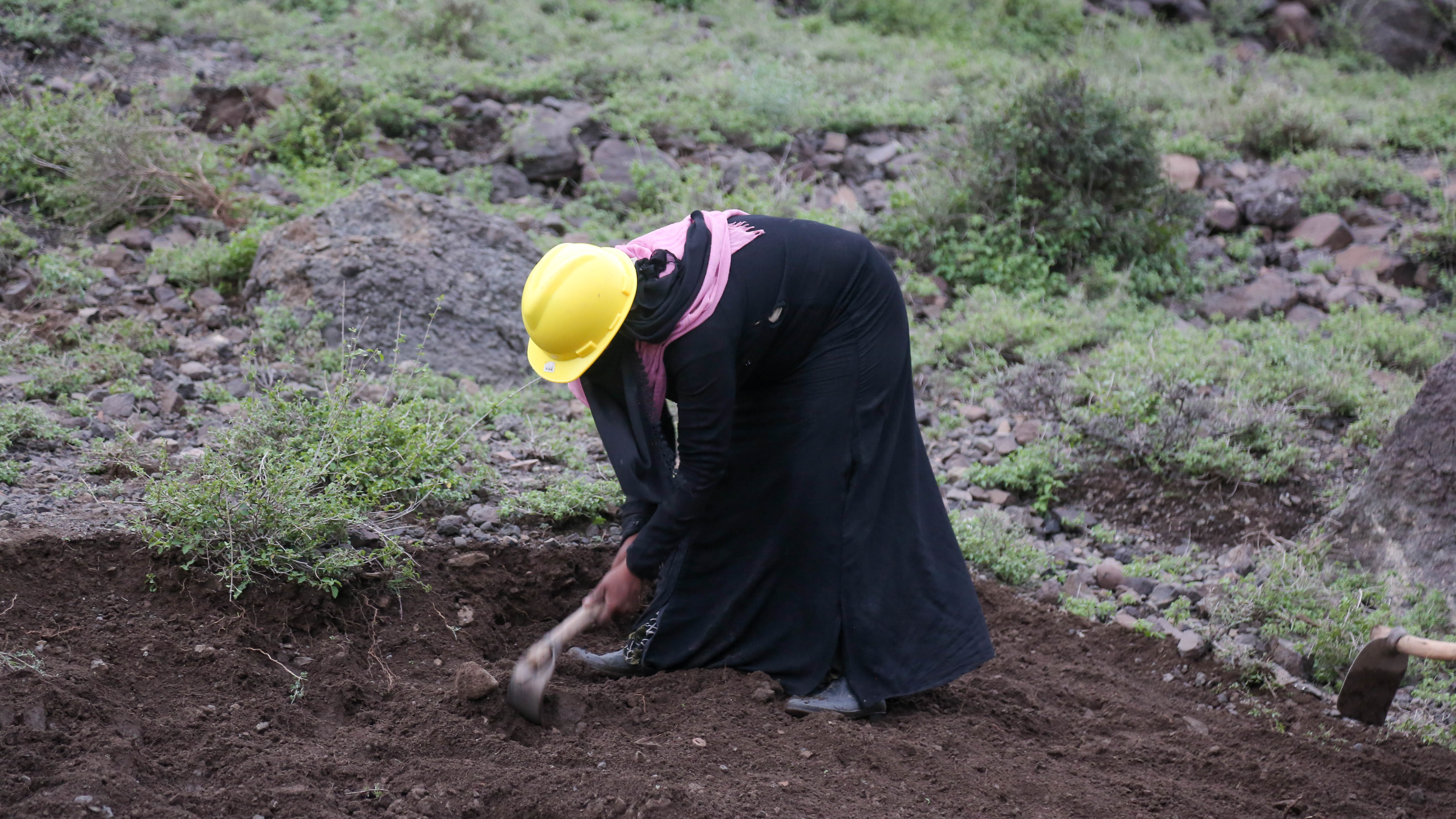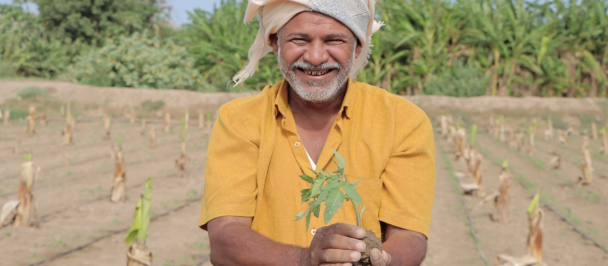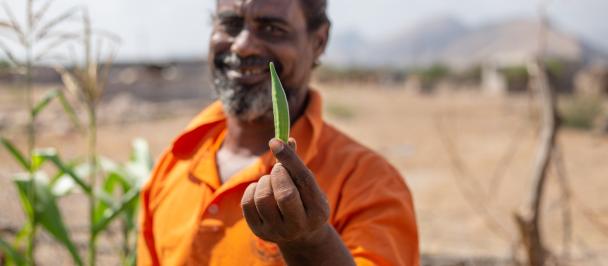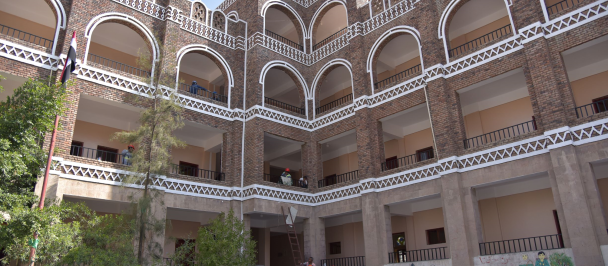A World Bank project aims to tackle the conflict-hit country´s most immediate challenge
Combating Food Insecurity in Yemen: From Individual Needs to Country-Level Resilience
January 23, 2023
Improving agricultural lands irrigation through the construction of floods spillways in Abs district, Hajjah
From kitchen gardens to agricultural infrastructure, a $127 million project is seeking to improve availability and access to food and nutritious diets, both in the short term and in the medium term. This will enhance Yemen’s capacity to respond to food insecurity, where conflict and climate change threaten the population with the worst famine the world has seen in recent decades.
The country´s eight-year-long war has decimated the economy, resulting in millions becoming food insecure. Hunger and malnutrition are among the most pressing challenges in Yemen today. More than 17.3 million Yemenis are food insecure and 51% of young children and 24% of women are in need of treatment for acute malnutrition.
Vast areas of Yemen’s agricultural lands were eroded by climate change-induced torrential floods exacerbating the country's persistent food insecurity.
Since July 2021, the “Yemen Food Security Response and Resilience Project (FSRRP)” funded by the World Bank brought three UN agencies together to contribute to improving food resilience among the country´s most vulnerable. The project is implemented by the United Nations Development Programme (UNDP), the World Food Programme (WFP) and the Food and Agriculture Organization (FAO).
UNDP implements $23.8 million of the project by improving agricultural production, infrastructure and building climate resilience. UNDP works in partnership and close collaboration with two key national institutions, the Social Fund for Development (SFD) and Public Works Project (PWP) to ensure both project implementation and knowledge transfer.
FSRRP interventions will contribute directly and indirectly to improving food security through restoration and improvement of agricultural lands and irrigation systems and improving access to markets through road rehabilitation. Locals will be employed in order to earn much needed income using the cash-for-work modality.
While conflict and the resulting economic crisis have been the key drivers of acute food insecurity in Yemen, several external shocks have worsened the food security situation, such as the impact of the war in Ukraine affecting the already severe and lingering food insecurity impacts of the COVID-19 pandemic.
How Yemen's gender gap affects food security
While war affects all, the issue of food security is one that has a particular impact on women: when food is scarce it is women who eat least, last and less well. And in a country that boasts the biggest gender gap in the world – Yemen ranked last out 153 countries in the 2020 Global Gender Gap Report by the World Economic Forum – the figures around female employment and spending power make for stark reading.
In Yemen, just 6% of women participate in the labour market, compared to 72% of men. A quarter of women in the labour market are unemployed, compared to 12% of men. Unsurprisingly, there is a huge gap in incomes. For every dollar a man makes in Yemen, a woman is estimated to make only 30 cents.

The Food Security Response and Resilience Project focuses on supporting female-headed households in its various projects- Taiz
One of the FSRRP goals is specifically focused on empowering women and improving their living standards, while the project as a whole will benefit women in target agrarian locations.
Although there are far fewer women in the employment market, it is estimated that almost half (46%) work in agriculture – compared to just 27% of men. This also places women at the centre of the climate change challenges the country is grappling with, from drought and desertification to flooding that damages vital agricultural infrastructure. Another tenet of the project is to promote climate-smart agricultural practices, helping communities to protect their food production for the future.
A multi-faceted approach to resilience
Food security is not just about staving off hunger and malnutrition today, but also about seeking sustainable solutions that provide resilience against future crises. The FSRRP is aligned to the UN Sustainable Development Goal of eliminating extreme poverty by 2030 and boosting shared prosperity.
The project will see vulnerable groups – including women, youth and internally displaced peoples– receive training as well as access to emergency employment through cash-for-work schemes that allow them to earn an immediate wage through productive work. This approach means that money, knowledge and skills are gained, allowing people to buy food today, as well as giving them a better chance of finding work in future and better serving their communities.
Through cash-for-work programmes, the project will ensure immediate access to food for an estimated 18,800 food-insecure households, with some 26,456 individual beneficiaries, around 30% of which are expected to be female-headed households. The cash-for-work scheme will see people employed in productive work to improve community infrastructure, so further benefitting vulnerable groups for years to come. The FSRRP will work to restore public and collective assets that have become dilapidated, including those affected by floods. It will contribute to restoring agricultural lands and water resources, with an expected 12,810 farmers- out of which 3,843 are female farmers- gaining access to improved water resources and 2,864 farmers- out of which 716 are female farmers- with improved access to land irrigation schemes and rehabilitated lands.
Members of the UNDP-WB Food Security Response and Resilience Project in the field in Abbs district, Hajjah
While the FSRRP is focused on the short and medium term – looking at fast solutions as well as sustainable futures that go beyond a single crop cycle – the overarching goal of the project is to lay the foundations for peace, to build social cohesion and to promote gender equality and women’s empowerment, essential steps to begin rebuilding a country and an economy devastated by conflict.
Funded by the World Bank’s International Development Association (IDA), the Yemen Food Security Response and Resilience Project (FSRRP) is implemented by the United Nations Development Programme (UNDP), The Food and Agricultural Organization of the United Nation (FAO), and the World Food Programme. The UNDP’s USD 23.8 million component of FSRRP improves agricultural production infrastructure and builds climate resilience and is implemented in partnership with the Social Fund for Development (SFD), and the Public Works Project (PWP).

 Locations
Locations

